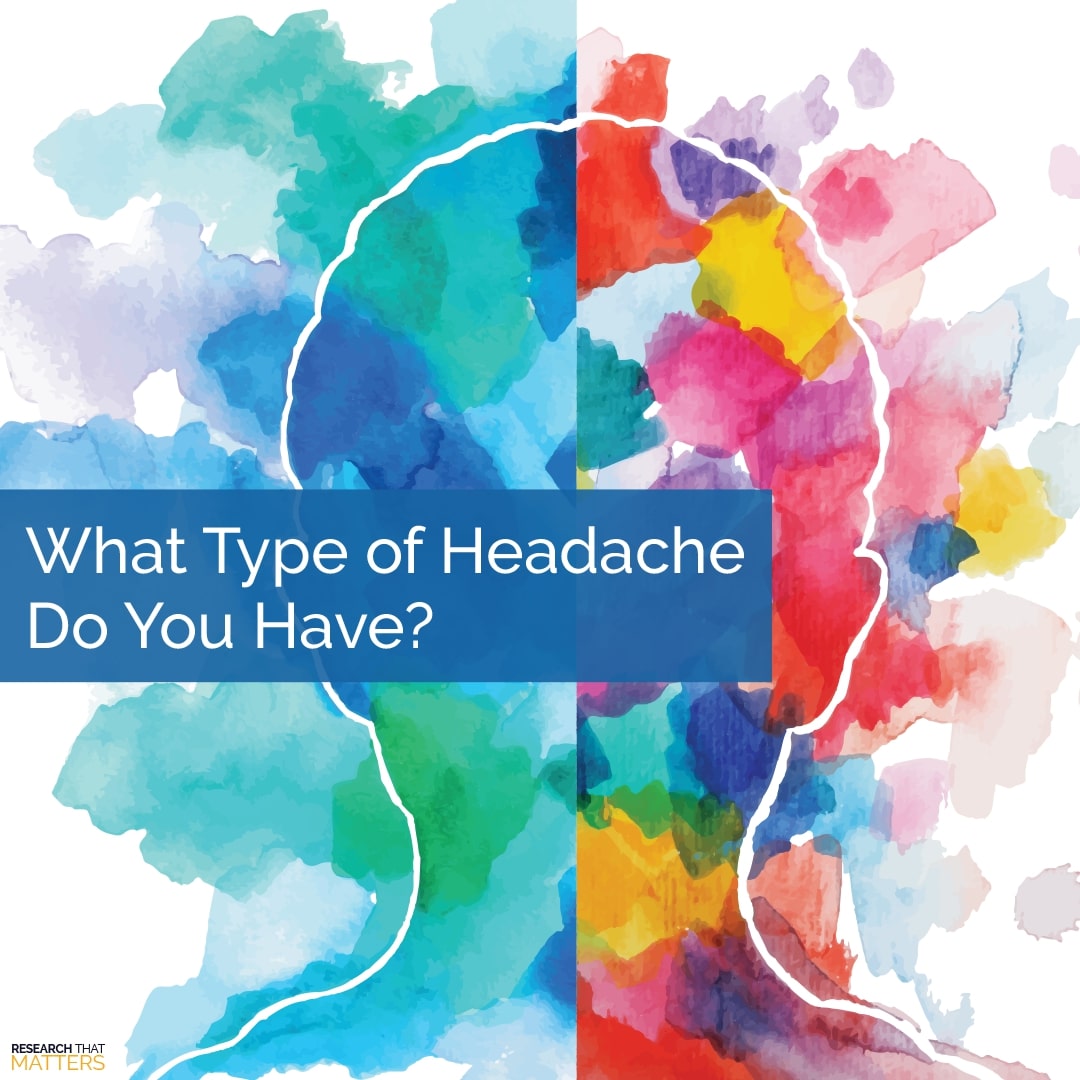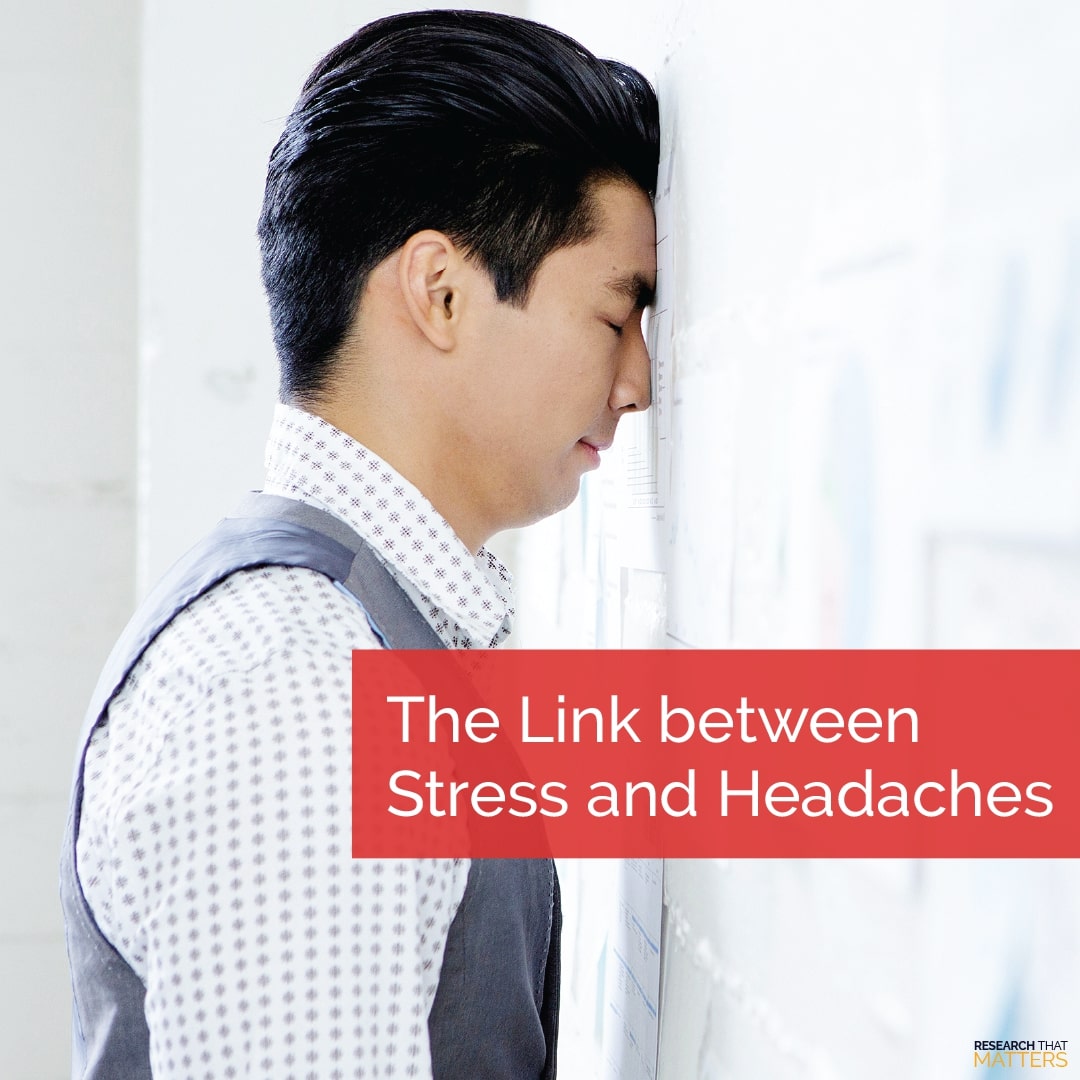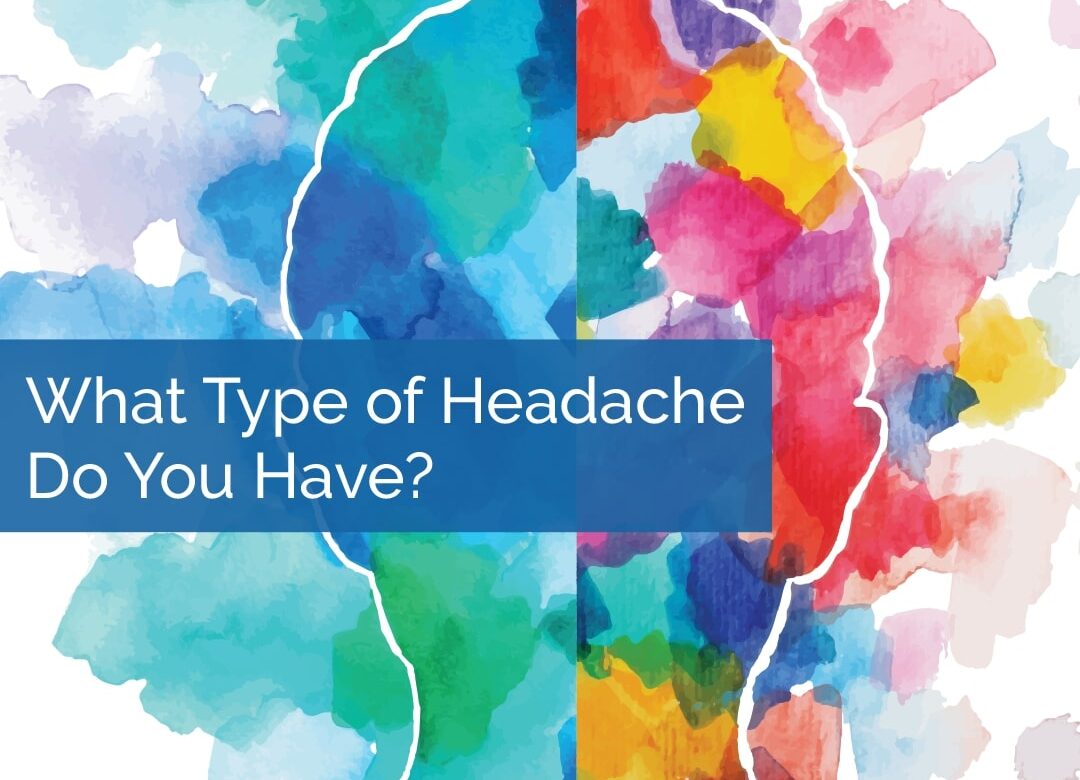What Type of Headache Do You Have?
 Bottom Line:
Bottom Line:
Headaches are experienced a little bit differently by everyone. Patients at our chiropractic headache clinic in Singapore may report feeling tired or that they're dealing with some blurred vision or that they have a chronically stiff neck - you name it. Often, they find themselves unable to function for the day because of their headaches.
But, while the symptoms may vary, all types of headaches have one thing in common — they are not "normal" to deal with frequently.
If you've been doing your best to live with recurring headaches, it's time to figure out the type or types of headaches you’re dealing with.
Why it Matters:
As you probably know all too well, there are many different types of headaches.
Knowing which one you have is the first step toward finding relief and the best way to do that is to consult with a healthcare professional.
And if you've been looking for a chiropractic headache clinic in Singapore, you've come to the right place.
Our doors are open and we're here to help.
Here's an overview of the most common types of headaches that people from all walks of life experience.
Most Common Types of Headaches
Migraine
Migraines come in all shapes and sizes. Typically you'll feel a throbbing on one side of your head.
This type of headache can be excruciating and can last up to 3 days.
You will likely feel nauseous and may be sensitive to light, sound, or smell.
Here are a few additional key facts about migraine types of headaches:
● These headaches are thought to be related to the release of inflammatory substances in the head.
● Migraine-type headaches are twice as common in women because of hormonal influences.
● Migraines often tend to pass quicker in children.
Tension Headache
Tension types of headaches are very common and affect up to 20% of the population.
They can also appear when you're experiencing a migraine.
Tension headaches usually consist of constant dull pain on both sides of the head as a result of tense or contracted neck and scalp muscles, and these types of headaches can last anywhere from a few hours to several days.
Stress, anxiety, and depression are a few common triggers of tension headaches. You could experience these types of headaches as the result of dehydration, loud noises, a lack of sleep, or even not getting enough exercise as well.
While that may seem like a long list with some potentially unavoidable triggers, the good news is that a number of them can be addressed as part of a healthy overall lifestyle.
Here are a few additional key facts about tension types of headaches:
● Tension-type headaches are the most commonly experienced headache.
● This headache is described as pressure or tightness, often like a band around the head.
● The pain associated with tension headaches can sometimes spread into or come from the neck.
Cluster Headache
Unlike migraine headaches, cluster types of headaches are usually experienced more by men than by women.
Those experiencing this type of headache generally feel an intense burning or even a piercing feeling behind or around one of their eyes.
Cluster types of headaches usually come when you least expect them and can last anywhere from approximately 15 minutes to 3 hours.
Here are a few additional key facts about cluster types of headaches:
● Cluster-type headaches affect fewer than 1 in 1000 adults and affect six men for every woman.
● Cluster headaches, while often brief, can occur up to several times a day.
● Those experiencing these types of headaches may have tearing and redness in the eye or a blocked nasal passage affected side.
Next Steps:
We all deal with headaches every now and then, so we often don't perceive them as serious enough to warrant a clinic visit.
In fact, it's estimated that half of the people who deal with headaches are self-treating.
That may be why many people are not aware that there are effective headache treatment options that are natural, non-invasive, and that don't involve prescription or over-the-counter pain medications.
That may be why many of the patients we see at our chiropractic headache clinic in Singapore are surprised to learn that overuse of medications intended to relieve their headaches can actually lead to more headaches!
So, if you're having trouble with migraine, tension, or cluster headaches, give us a call today.
Recent studies have shown that chiropractic care can play a big part in reducing the intensity, severity, and frequency of many common headaches without those risky medications.
Our compassionate team will work with you to identify the root cause of your headaches and we'll provide the gentle, movement-based care chiropractors are known for to help you break free from your headache pain.
Science Source(s):
Tension Headache. MedlinePlus. 2019.
Headache Disorders. WHO. 2016.
The Link between Stress and Headaches
 Bottom Line:
Bottom Line:
Are you feeling rushed? Are you dreading a big meeting at work?
Take it from the leading provider of natural tension headache treatment in Singapore - these events can all add up to stress and headaches.
Often it's not the event itself that results in a headache but your body's reaction to stress.
If you deal with stress by clenching your jaw or tensing your muscles, you may be more likely to experience headaches due to these coping behaviors.
So, why does this happen and what can be done about the stress and headaches cycle? Read on.
Why it Matters:
Way back when, our bodies evolved our fight or flight response for the purpose of making sure we would be adequately prepared to deal with any of the physical dangers we very realistically could have encountered on a daily basis.
As a result, our heart and breathing rate, blood pressure, and blood flow to our extremities all increase during such an event. It's this fight or flight response that allowed us to effectively prepare for battle or to flee from predators in the wild.
Of course, we're still hardwired with this very useful and necessary instinct, but times certainly have changed! Today, our bodies find it more difficult to differentiate between physical danger and psychological stress. We may react to that dreaded big meeting at work with the same internal reactions as if we were being chased by someone or something!
So, how does all this relate to headaches?
If there's one thing you should understand about stress, it's that it can and often will worsen your symptoms when you're not feeling well.
There is a very real link between all kinds of stress and headaches.
Episodic headaches, or those that occur sporadically, are often triggered by isolated, stressful incidents.
A few of the most common everyday stress triggers include anxiety, poor sleep habits, or significant life changes.
Chronic headaches are often triggered by daily, constant stress and a lack of regular exercise.
To help you combat this cycle of stress and headaches, we've compiled a list of some of our top tips for reducing stress so you can reduce your headaches.
Tips for Reducing Stress and Headaches
Exercise More
Regular exercise boosts endorphins, which help put you in a better mood.
Making time to get up, get out, and get moving regularly also helps boost your overall energy levels so you can shift your focus away from whatever event or string of events is stressing you out.
Get Some Sleep
We repeat: get some sleep to turn the dial down on stress and headaches.
When you can, aim to get at least 8 hours of sleep each night and do your best to keep your sleep schedule consistent.
Falling asleep at the same time every night and getting up at the same time each morning will help you fall into a healthy sleep pattern.
Recent studies indicate that our sleeping habits can contribute to our risk of experiencing headaches, particularly migraines.
In fact, the majority of people living with chronic migraines and other chronic types of headaches often also experience some level of insomnia.
Relax
This is more than just a mantra when it comes to reducing stress and headaches, ladies and gentlemen.
It's important to set aside time to specifically practice relaxation techniques that can help you feel calm during periods of high stress.
Meditation and yoga are two techniques that can help you feel both physically and mentally relaxed so you can mitigate the onset of stress.
See a Chiropractor
Keeping your spinal joints moving correctly can help reduce the strain on your spine and its supporting muscles.
Chiropractic care can help you relieve pent-up stress in your body and get you feeling better quickly.
So, come see us for natural tension headache treatment in Singapore.
Tension headaches are triggered when the neck and scalp muscles become tense or contract, and this often occurs when we hold our heads in one position for an extended period of time. Many people spend their days working at a desk, and doing so for hours on end usually results in an uptick in tension headaches. Sleeping with your neck in an awkward position may also trigger a tension headache.
Recent studies have shown that chiropractic care can help headache patients find lasting relief.
Chiropractic adjustments to specific joints in the neck, upper body, back, and other extremities can help correct the physical imbalances behind those tension headaches so you not only move better but feel better.
Next Steps:
So, can stress cause headaches? Yes.
While there is a link between stress and headaches, now you know there are very simple, real ways you can combat this cycle.
Remember, when you feel your stress levels starting to rise, take a moment to practice your favorite relaxation techniques.
Make time for essential preventative self-care like daily exercise, balanced meals, and balanced sleep.
And be sure to periodically schedule visits with your favorite chiropractic team.
If you're interested in natural tension headache treatment in Singapore, we'd love to help you!
Our expert team will work together with you to keep your body relaxed and moving well to help you find lasting relief from stress and headaches.
Science Source(s):
Sleep and Migraine. Headache. 2018.
Manual Therapy Effect on Tension Headache. Eur J Phys Rehabil Med. 2016.
How Does Stress Impact the Body? Forbes. 2018.
Tension Headache. MedlinePlus. 2019.
The Benefits of Chiropractic Care for Daily Headaches
 Bottom Line:
Bottom Line:
Half of the world's adult population struggles with headaches at least once a year.
And while headaches can seem like no big deal most of the time, they also cause very real pain that affects your quality of life.
We've talked to a number of patients who regularly put off seeing a chiropractor specializing in headaches in Singapore to help them find relief because so many of us write off headaches as just another part of life.
But, why learn to live with daily headaches when you can ease them away, naturally?
Read on to learn about the very real benefits of chiropractic care for daily headaches.
Why it Matters:
If you're here, it's probably no secret to you that a quick visit to a chiropractor can provide you with the care you need to find actual relief from head, neck, or back pain.
Headaches are among the primary reasons many people in many different countries worldwide see a chiropractor.
Most people think of a visit to the chiropractor when their head, neck, or back hurts for good reason.
We can help you find lasting relief from your headaches in a variety of ways (especially if you're looking for a chiropractor specializing in headaches in Singapore).
Here's a quick overview of the top 3 reasons you can benefit from chiropractic care for daily headaches.
How Chiropractic Care Can Help Relieve Headaches
1. We Follow a Whole Person Approach
We will perform a comprehensive history and examination during your initial assessment. This assessment will help us first determine if your symptoms are the result of any spinal issues. We'll also rule out other possible causes of your headaches.
Your history and examination can help us identify your headache triggers so we can advise you about the lifestyle changes you need to find relief as part of your chiropractic care for daily headaches.
For example, the foods you eat can contribute to your risk of experiencing frequent headaches.
2. We Administer Person Specific Chiropractic Adjustments and Care
Recent studies have shown that chiropractic care can help improve headache pain.
Let's look at cervicogenic headaches as an example. A cervicogenic headache is referred pain in the head from the neck. It's what we call a secondary headache because it's caused by another physical issue in the body.
Researchers studying the efficacy of chiropractic treatment for the care of these headaches have presented findings supporting the use of adjustments to lessen their intensity, frequency, and duration. In other studies, chiropractic adjustments were found to provide more relief than deep massage.
In still other studies, chiropractic care has proven to be helpful for the management of chronic migraines.
In an age where medication overuse is frequent, the effectiveness of chiropractic care for daily headaches is exciting news that more people need to know.
Relying too much on medications to mask your symptoms means that many people may never treat the root cause of their headaches.
Those same people also become more at risk for experiencing medication rebound headaches - yes, you read that right. Medication overuse will almost certainly lead to more headaches.
Chiropractors use a number of safe, non-invasive, non-pharmacological treatments for headaches. These include lifestyle education, manual or device-assisted spinal adjustments, spinal mobilization, heat/ice, massage, advanced soft-tissue therapies, and even strengthening and conditioning exercises as you'll see next.
Most people are familiar with the hands-on aspect of chiropractic care for daily headaches, and our clinicians are highly trained in performing gentle and effective spinal adjustments. This training allows us to use our hands to apply a small force to a specific spinal joint. When the force is applied, you might hear a slight pop, and some people feel immediate relief!
3. We Give Guidance That Includes Therapeutic Exercises
As we just noted, yes, chiropractors often incorporate strengthening and conditioning exercises into their patients' care plans.
We want you to find lasting relief after all, and movement goes a long way!
Deep neck flexion exercises are great for treating the cervicogenic headaches we covered above.
Other active care techniques and exercises are another component of chiropractic care for daily headaches that can be performed from the comfort of your own home to help you ease your headaches between your appointments.
Next Steps:
It's time to bring an end to that throbbing in your head, and we're here to help!
You don't need to continue to live in pain.
The benefits of chiropractic care for daily headaches are real.
Movement is a critical part of the healing process, which is why spinal adjustments are so effective and seeing a chiropractor specializing in headaches in Singapore is so important - yes, we're talking to you neighbor!
If it's been some time since your last adjustment or you're ready for your first, give us a call.
Our team will be with you every step of the way on your road to headache relief!
Science Source(s):
Headache Disorders. WHO. 2016.
Chiropractic Therapy for Headache. BMC Res Notes.2017.
Chiropractic Treatment of Headaches. JMPT. 2011.
Spinal Manipulation for Chronic Headache. Spine J. 2010.
Relieving Migraine Headaches
 Bottom Line:
Bottom Line:
Few things can ruin your day as much as a headache.
Relieving migraine headaches in particular can feel impossible.
They can seemingly appear out of nowhere, though they may hint at their arrival with two other heavy hitters: visual discomfort and nausea.
Whatever the symptoms, a migraine is one visitor you don't want sticking around.
Why it Matters:
Take it from the leading chiropractic migraine specialist in Singapore - knowing when a migraine is starting and understanding what matters when it comes to preventing and relieving migraine headaches is critical to improving your quality of life.
Let's take a look at the four phases of a migraine headache.
Four Phases of Migraine
There are typically four phases of a migraine that many sufferers will experience:
Premonitory
This phase is usually the warning that a migraine is coming on. Many people will experience mood swings, neck stiffness, and constipation.
Aura
About 1 in 4 people who suffer from migraines will get an aura.
Migraine sufferers often report visual or sensory auras in the minutes before the actual headache. Visual auras can result in flashing lights and blurred vision, whereas sensory auras affect speech and the ability to think clearly.
Vision problems usually start 20 minutes to an hour before the headache. Even if you don't get an aura, the headache itself may cause vision trouble.
Headache
A migraine headache can be moderate or severe and is likely to occur on only one side of the head. Migraine sufferers will notice that their headaches worsen with physical activity, so rest is critical..
Postdrome
The final phase in the migraine cycle is the postdrome. This occurs once the headache ends and leaves the afflicted person feeling exhausted.
Treatment Options for Relieving Migraine Headaches
Many migraine headache sufferers do not receive effective care.
For example, in the United States of America and the United Kingdom, it's estimated that only half of chronic migraine sufferers seek the help of a healthcare professional, despite the often significantly disruptive symptoms.
These include:
● Throbbing headaches of moderate to severe intensity on one side of the head.
● The appearance of nausea and vision changes.
● Recurring episodes can last anywhere from hours to days.
Most are solely reliant on over-the-counter medications even though there are no surefire options that exist for relieving migraine headaches.
Similarly, it's estimated that half of the people who experience chronic or occasional headaches will fall back on attempting to self-treat with over-the-counter pain medications despite the increased risk of experiencing rebound headaches that can happen as a result of overuse.
When it comes to migraines, this risk here is associated most with aspirin, acetaminophen, and caffeine combinations.
Of course, based on the symptoms and stages characteristic of most migraines, it's easy to see why many people aren't aware that there are non-pharmacological ways to manage their attacks.
Many of our local migraine patients who come in often relay this as a reason they waited so long to find a chiropractic migraine specialist in Singapore.
Trust us, when the first time the headache comes back is reason enough to see a healthcare professional.
Just like with cervicogenic and tension headaches, it is possible to lessen the frequency, intensity, and severity of your migraines with a combination of lifestyle changes and chiropractic care.
While the cause of migraines is unclear, there are specific triggers that are often attributed to their onset.
Knowing what those triggers are and making proactive changes to any daily habits that may be associated with those triggers is crucially important to finding lasting relief from migraine headaches.
And, in one recent study, researchers observed a significant reduction in migraine days for those participants receiving chiropractic care.
Next Steps:
The good news is that you can start effectively relieving migraine headaches by being proactive with your daily habits.
You know now that making time for periodic chiropractic care is an important step in finding relief from migraine pain, so don't skip that next (or first!) adjustment.
If you're looking for a chiropractic migraine specialist in Singapore, our doors are open and we're ready to help you find relief!
What about those triggers we mentioned?
Here are some of the most common:
● Consumption of alcoholic or caffeinated drinks and tobacco
● Periods of stress
● Exposure to intense lights or smells
● Periods of intense physical exertion
● Changes to sleeping or eating habits
● Certain medications
● Consumption of aged, salty, or processed foods and certain food additives
Migraine sufferers do well with preventive measures such as diet changes or taking steps to reduce stress.
If you need help determining which triggers are contributing to your headaches, don't hesitate to ask us during your next appointment.
To ensure you're on the right path and headed toward lasting relief from your migraines, it's wise to connect with a healthcare professional.
“Doctor Google” isn't really a doctor after all!
Our compassionate team has personally dealt with our own share of migraine headaches, and we're here for you!
From lifestyle optimization advice to chiropractic adjustments and beyond, let us help you put those migraines in the rear view mirror.
Science Source(s):
Chiropractic Therapy for Migraine. Eur J Neurol. 2017.
Headache Disorders. WHO. 2016.
What is a Migraine? Web MD. 2020.









